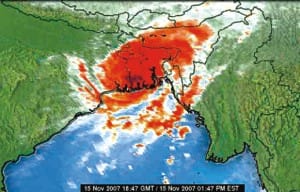The eye of the storm

Last Thursday the sun dipped behind the western horizon to usher in a night darker than the darkest of nights. There was smell of death and destruction in the air but we failed to notice. We had no hunch whatsoever what was to transpire by midnight in some parts of the country. On that ominous night the fury of a million serpents metamorphosed in the shape of hurricane Sidr.
The hurricane came in from the Bay of Bengal and raged on to the land with unrestrained viciousness, smashing everything in its wake, washing away humans and cattle-head to the cruel sea. In a moment, unkind waters snatched babies from the bosom of their mothers. In a flash, thousands of children were made orphans. Today, the stench of the bloating carcasses hangs in the air of 18 coastal districts. Today, the wailing of mothers and children makes the air heavy in numerous villages.
As we think in hindsight, we feel we should be thankful to the hurricane in some way or the other. In fact, it had been hanging around over the Bay for quite a while, exposing its fangs and claws every now and then before striking with full potential. This delay actually allowed the administration and the people in general plenty of time to undertake various measures, such as, issuing warnings, taking ships and vessels to safer areas, hoisting danger signals, evacuating people right from the edge of waters of the sea and guiding people to the storm shelters.
It is indeed a matter of research as to how many more people might have died had the administration been less proactive. But here it deserves to be mentioned that the level of coordination among the civilian administration, the armed forces, media and the local level people to take pre-emptive measures needs to be appreciated. Such quick decisions and steps no doubt went a long way to minimise the casualty figures significantly.
In some uncanny way hurricane Sidr reminds us of the devastation caused by the great Tsunami that struck the coasts of Sri Lanka and Thailand in 2005. It was one to happen in many decades in that part of the world, and we even felt the jolt in Bangladesh in a minor way. The Tsunami came in from the sea like an angry, wounded animal to snatch away people from the third floors of hotels and homes. Similarly, hurricane Sidr came with tidal waves as high as 20 feet to wipe away village after village.
Shall we learn a lesson or two from the Sidr, just as the Sri Lankans and the Thais had learned from Tsunami? Pertinent question, and we need answers. After the Tsunami had left a large trail of dead bodies and rubble, the relevant authorities in the said two countries installed many detecting and warning devices and gave special training to people so that they could give prior warnings of a looming disaster and evacuate people to safer zones.
Shall we do something like that? Are we mentally motivated enough to do something like that? Sadly enough, our experience is, immediately after every disaster we attend some seminars and workshops at home and abroad, then we write some articles for newspapers and attend some new-craze-talk-shows on televisions. We share our great wisdom with the viewers and then go home with the cash honorarium given by the channels. Within a month we forget the dead and go about doing business as usual.
One report has caught our attention. It is said that in the Sundarbans, thick growth of mangrove trees successfully reduced the impact of the hurricane as it came at a speed of 200km per hour. The villages behind the trees were saved! Now, that put ideas in our heads. Can we think of having such mangrove trees planted on the water edge throughout the length and breadth of the coastal area? Can we motivate the villagers who live near the rivers and seashore to plant them on their own volition? Are there leaders to undertake the task?
More questions. Has global warming anything to do with hurricanes like Sidr? We do not know, but we have this primordial feeling in the guts that somehow they are connected. Can we expect our very own scientists to get busy doing some research on this instead of talking in seminars? Let us see some fundamental works done in this regard. If they can come up with concrete findings, only then we shall be able to kick the posteriors of some developed countries that are spewing poison into air with impunity.
Shahnoor Wahid is Senior Assistant Editor of The Daily Star.

 For all latest news, follow The Daily Star's Google News channel.
For all latest news, follow The Daily Star's Google News channel. 



Comments